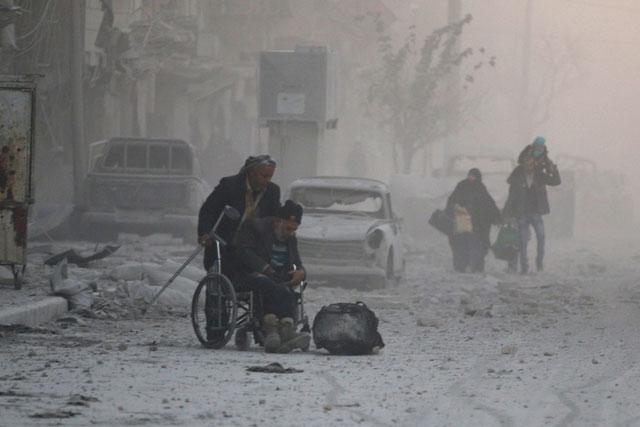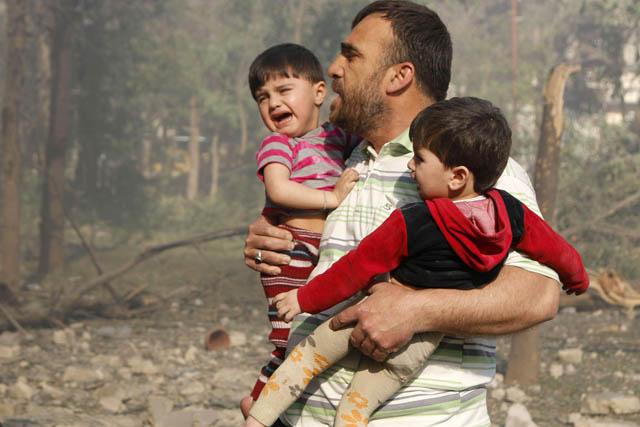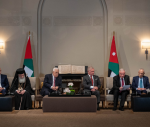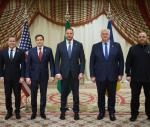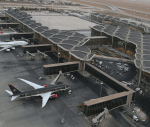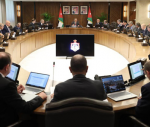You are here
Syria clashes kill at least 21 rebels in Aleppo province
By AP - May 05,2014 - Last updated at May 05,2014
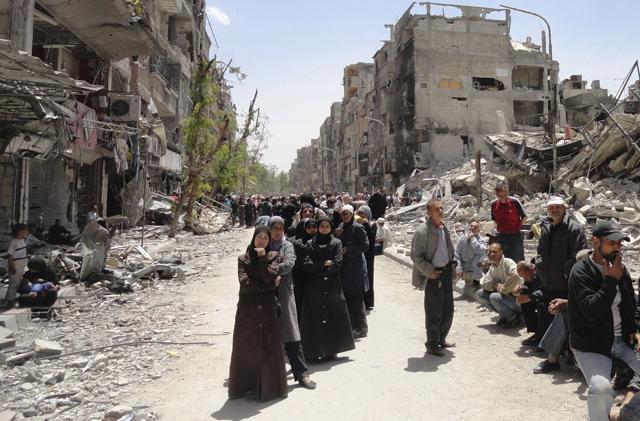
BEIRUT — Fierce fighting in Syria’s contested northern province of Aleppo killed at least 21 rebels on Monday as rockets slammed into a government-held district in the provincial capital, killing nine people.
The clashes, which erupted after midnight Sunday and continued through the day Monday, also left at least 30 soldiers dead or wounded, said the Britain-based Syrian Observatory for Human Rights. The Syrian government does not publicise its casualties in the war.
President Bashar Assad’s forces, backed by Lebanese Hizbollah fighters and pro-government militias, have been trying to wrest as much territory as possible from the opposition in Aleppo and elsewhere in Syria ahead of the June 3 presidential elections.
The fighting in the province, pitting troops loyal to Assad against several rebel groups, including Al Qaeda-linked Nusra Front, was concentrated around two rebel-held villages in the province, said the Observatory, which has documented the 3-year-old conflict based on reports from a network of activists on the ground.
In the city of Aleppo, Syria’s largest and its former commercial hub, government forces have been relentlessly shelling opposition districts with aircraft and artillery in recent months.
On Monday, government aircraft bombed three rebel-held districts in the city, including Masaken Hanano, where at least two people died, the Observatory said. The activist group also reported heavy fighting in Mleiha east of Damascus and air strikes on the capital’s district of Jobar on the edge of the city.
Aleppo has been divided between government- and opposition-held areas since rebels launched an offensive there in mid-2012, capturing whole neighbourhoods and large sections of territory outside the city and along the border with Turkey.
The rebels have been striking back, firing mortars and makeshift rockets into cities and towns under control of Assad’s forces. They have also detonated several car bombs in major cities, including in the capital, Damascus.
The state-run SANA news agency said rockets struck in Aleppo’s residential neighbourhood of Ashrafiyeh overnight, killing nine people and wounding several, mostly women and children.
Syria’s conflict, which began with largely peaceful protests in March 2011, has evolved into a civil war with sectarian overtones, pitting predominantly Sunni Muslim rebels against Assad’s government that is dominated by Alawites, a sect in Shiite Islam. More than 150,000 people have been killed and millions have been displaced by the war.
Islamic extremists, including foreign fighters and Syrian rebels who have taken up hardline Al Qaeda-style ideologies, have an increasingly prominent role in the war, dampening the West’s support for the rebellion to overthrow Assad. Many Syrians, particularly religious minorities, have also come to doubt the opposition, fearing that Islamic radicals would take over if Assad is ousted.
Assad took power after the death of his father, Hafez, in 2000. He has maintained throughout the conflict that his government is not facing an uprising, insisting that his army is fighting terrorists that are part of the Western- and Gulf Arab-sponsored plot to destroy Syria.
Over the past year, Assad’s forces have been taking back rebel-held areas throughout Syria with a mix of crippling blockades, deals with rebels and relentless pounding of opposition-held areas. Presenting himself as a defender of united and religiously mixed Syria, Assad has pushed for the June 3 vote to seek a third seven-year term amid fierce fighting.
Despite two other candidates on the ballot, Assad is widely expected to win the vote, which opposition activists and Western countries have condemned as a sham. The vote is expected to be held only in government-controlled territory.
Syrian officials have said they will not accept international monitors to oversee the vote, but on Monday, Parliament Speaker Jihad Laham invited pro-government countries to send representatives.
Addressing a parliament session, Laham called on the BRICS group — Brazil, Russia, India, China and South Africa — and other “friendly” states to send experts “to oversee this free and democratic experienc”.
International efforts to halt Syria’s bloodshed have failed and millions of Syrians are in dire need of humanitarian aid. The UN Secretary General Ban Ki-moon said last week that almost 3.5 million civilians in Syria have virtually no humanitarian aid access, calling on both sides in the conflict to stop blocking aid.
In Greece, the head of the Arab League, Nabil Elaraby, sharply criticised the UN, saying the international community has “utterly failed to stop the fighting” in Syria, and calling on the Security Council to “impose a ceasefire” in Syria.
“Enough grief, enough destruction and enough suffering,” Elaraby said in Athens, where he was attending a conference on Arab-European Union ties. “The Security Council has to assume its charter responsibilities and impose an immediate ceasefire.”
Related Articles
ALEPPO — The Syrian army tightened its grip on Saturday on rebels besieged in Aleppo along with thousands of civilians but suffered a setbac
The head of an international mission to Syria charged with destroying the country’s chemical weapons called on President Bashar Assad’s government Sunday to ensure it meets a deadline to destroy all its toxic chemicals amid a raging civil war.
ALEPPO — Car bombs and rocket fire shook Aleppo on Saturday as rebels battled to break a suffocating siege by the Syrian regime, accused by


